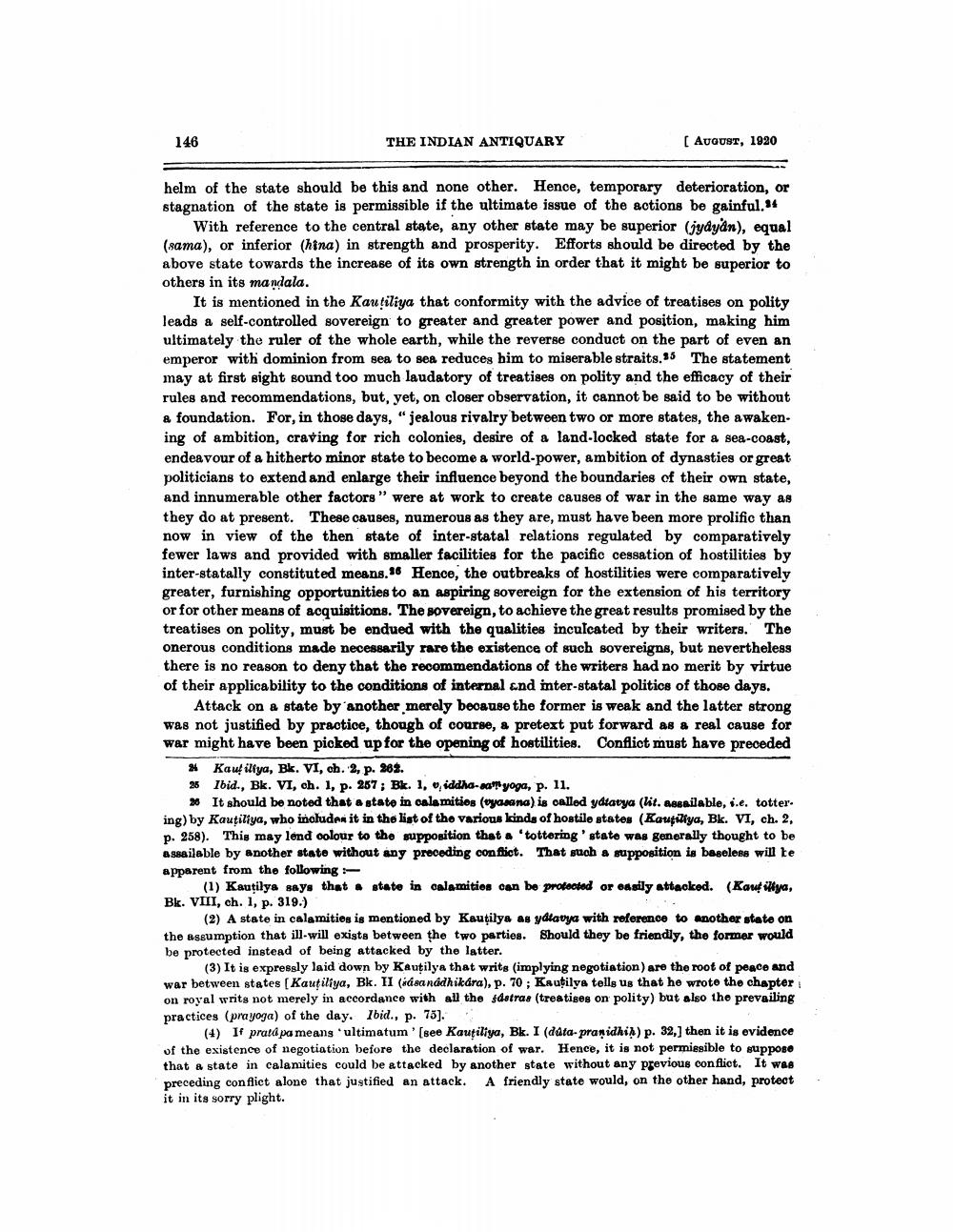________________
146
THE INDIAN ANTIQUARY
( August, 1920
helm of the state should be this and none other. Hence, temporary deterioration, or stagnation of the state is permissible if the ultimate issue of the actions be gainful.14
With reference to the central state, any other state may be superior (jydyan), equal (sama), or inferior (hina) in strength and prosperity. Efforts should be directed by the above state towards the increase of its own strength in order that it might be superior to others in its mandala.
It is mentioned in the Kautiliya that conformity with the advice of treatises on polity leads a self-controlled sovereign to greater and greater power and position, making him ultimately the ruler of the whole earth, while the reverse conduct on the part of even an emperor with dominion from sea to sea reduces him to miserable straits.35 The statement may at first sight sound too much laudatory of treatises on polity and the efficacy of their rules and recommendations, but, yet, on closer observation, it cannot be said to be without a foundation. For, in those days, "jealous rivalry between two or more states, the awakening of ambition, craving for rich colonies, desire of a land-locked state for a sea-coast, endeavour of a hitherto minor state to become a world-power, ambition of dynasties or great politicians to extend and enlarge their influence beyond the boundaries of their own state, and innumerable other factors” were at work to create causes of war in the same way as they do at present. These causes, numerous as they are, must have been more prolific than now in view of the then state of inter-statal relations regulated by comparatively fewer laws and provided with smaller facilities for the pacific cessation of hostilities by inter-statally constituted means.96 Hence, the outbreaks of hostilities were comparatively greater, furnishing opportunities to an aspiring sovereign for the extension of his territory or for other means of acquisitions. The sovereign, to achieve the great results promised by the treatises on polity, must be endued with the qualities inculcated by their writers. The onerous conditions made necessarily rare the existence of such sovereigns, but nevertheless there is no reason to deny that the recommendations of the writers had no merit by virtue of their applicability to the conditions of internal and inter-statal politics of those days.
Attack on a state by another merely because the former is weak and the latter strong was not justified by practioe, though of course, a pretext put forward as a real cause for war might have been picked up for the opening of hostilities. Conflict must have preceded
* Kaufiliya, Bk. VI, ch. 2, p. 263. 25 Ibid., Bk. VI, ch. 1, p. 257 ; Bk. 1, iddha-saf yoga, p. 11.
% It should be noted that a state in calamitios (vyasana) is oalled ydtavya (lit. Aebailable, s.e. totter. ing) by Kautiliya, who includes it in the list of the various kinds of hostile states (Kautiliya, Bk. VI, ch. 2, p. 258). This may lend colour to the supposition that a 'tottering state was generally thought to be assailable by another state without any preceding conflict. That such a supposition is baseless will te apparent from the following
(1) Kautilys says that state in calamities can be protected or easily attacked. (Kaut ilya, Bk. VIII, ch. 1, p. 319.)
(2) A state in calamities is mentioned by Kautilya as ydtavya with reference to another state on the assumption that ill-will exists between the two parties. Should they be friendly, the former would be protected instead of being attacked by the latter.
(3) It is expressly laid down by Kautilya that writs (implying negotiation) are the root of peace and war between states (Kautiliya, Bk. II (ndsanádhikára), p. 70; Kautilya tells us that he wrote the chapter on royal writs not merely in accordance with all the $dstras (treatises on polity) but also the prevailing practices (prayoga) of the day. Ibid., p. 75).
(4) If prata pa meang ultimatum '[see Kauçiliya, Bk. I (data-pranidhih) p. 32,] then it is evidence of the existence of negotiation before the declaration of war. Hence, it is not permissible to suppose that a state in calamities could be attacked by another state without any previous conflict. It was preceding conflict alone that justified an attack. A friendly state would, on the other hand, protect it in its sorry plight.




